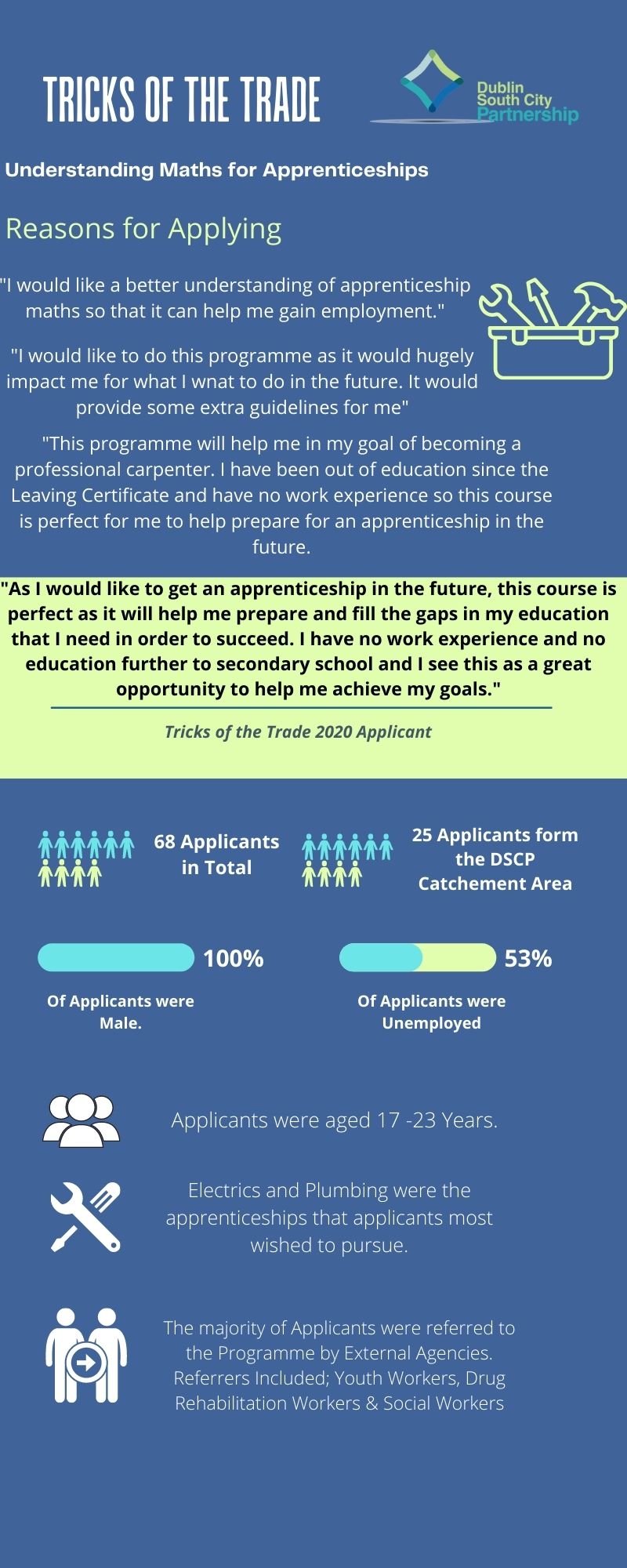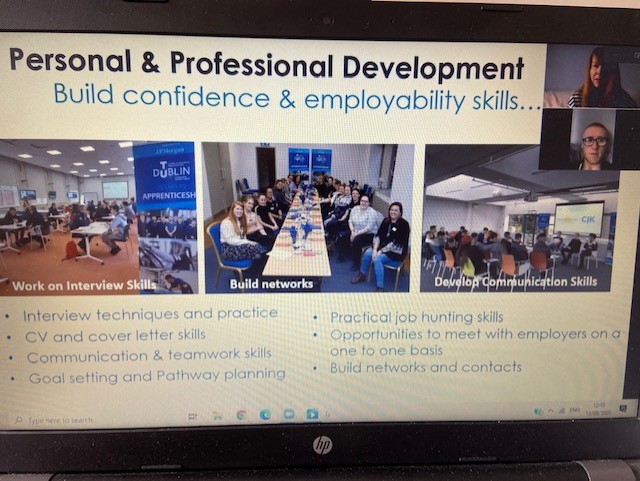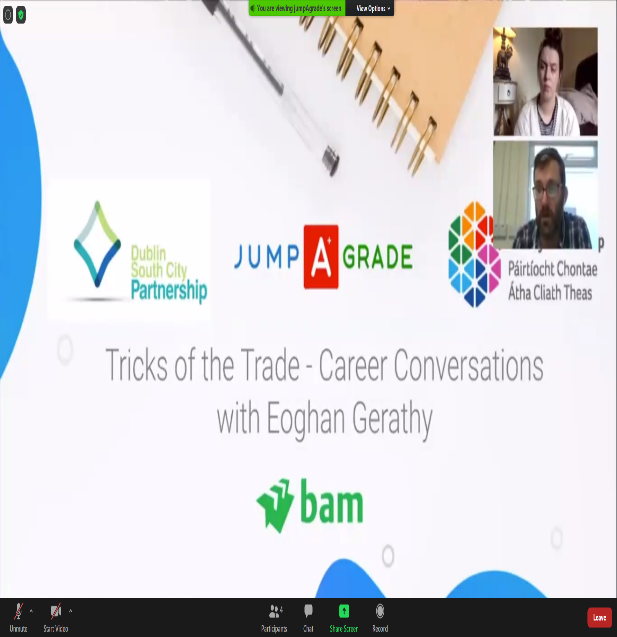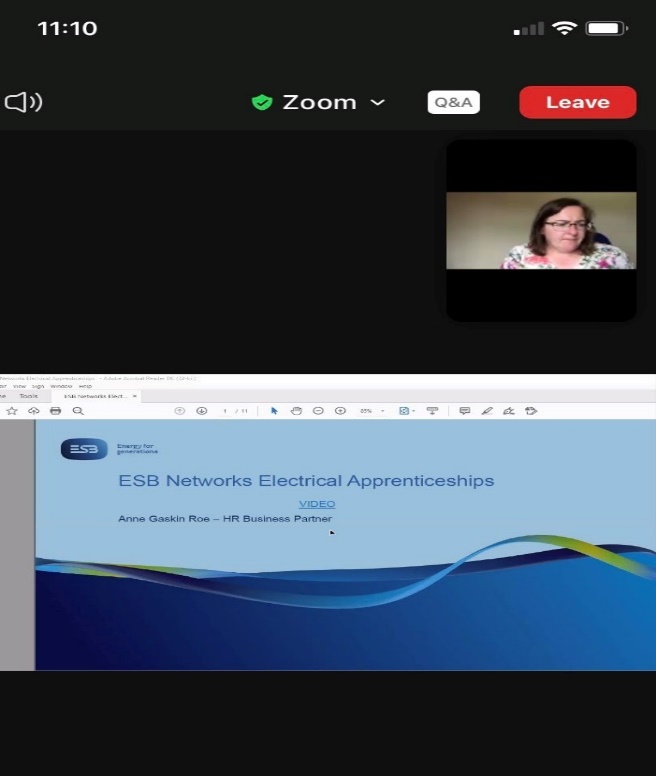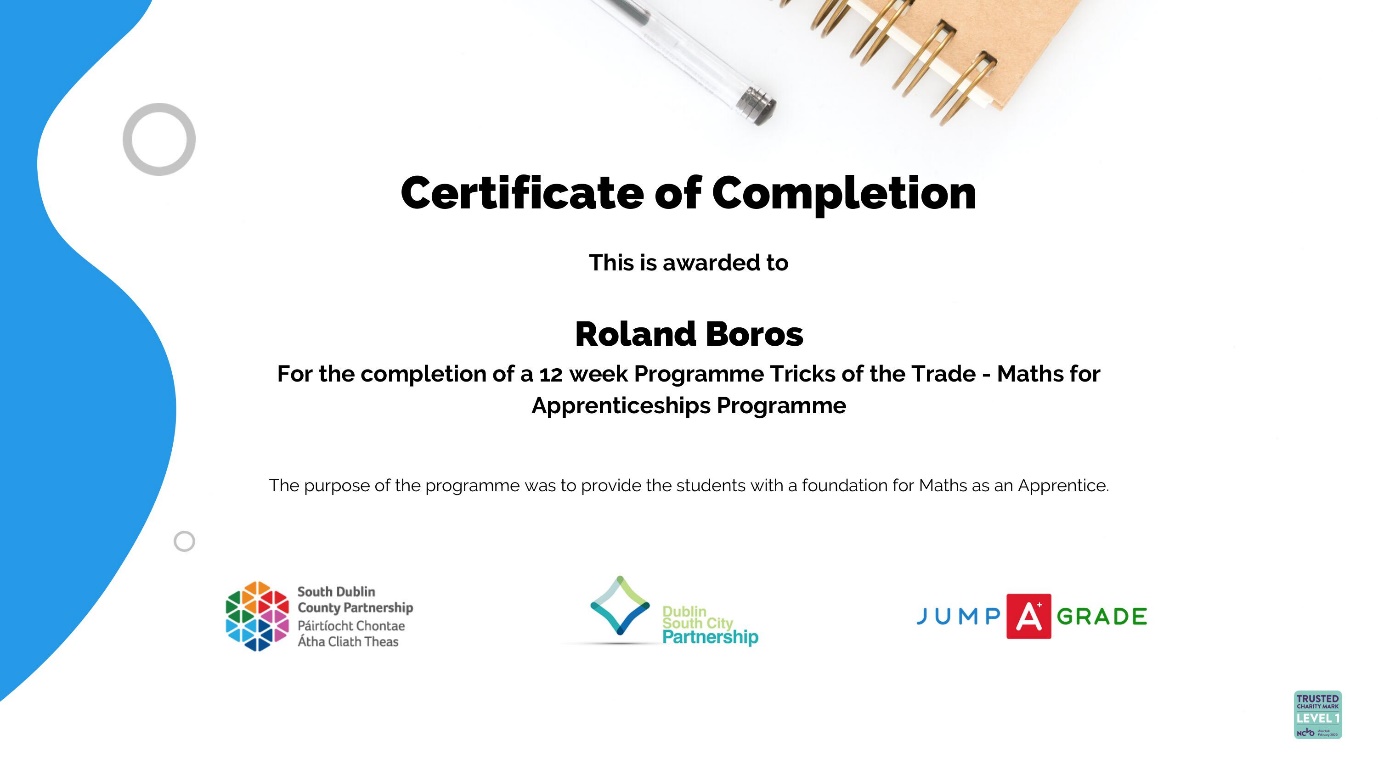Demonstration of Work SICAP 2018 -2022
2021 SICAP Case Study – DSCP Employment Team/Education Team- Apprenticeship Initiatives
Primary Theme: Goal Two Project
The programme falls under the following Social Inclusion and Community Activation Programme (SICAP) programme goal, thematic area and target outcomes and group:
|
Programme Goal |
Goal 2 – Supporting Individuals – ‘To support disadvantaged individuals to improve the quality of their lives through the provision of lifelong learning and labour market supports.’ |
|
Thematic Area |
G2:4: Prepare people for employment and to remain in work. |
|
Target Outcomes |
G2 – 4:1 SICAP clients are better prepared to enter the labour market. |
|
Target Group |
Unemployed individuals from disadvantaged areas. |
Contents
Tricks of the Trade – Understanding Maths for Apprenticeships 6
Programme Background
2021 proved to be a significant year for apprenticeships in Ireland with the government announcing its Action Plan for Apprenticeships 2021 – 2025. The Action Plan sets up a new 5 year strategy to deliver on the Programme for Government commitment of reaching 10,000 new apprenticeship applications by 2025. As outlined in Government documents “the intention of the Action Plan is to fully embed apprenticeship as an option within the national education and training system, transforming apprenticeship from a well-established route to a broad range of careers which is attractive to both employers and learners. By 2025, apprenticeship will sit firmly within the broader education and training landscape as a core offering.”
This new action plan is one that was greatly welcomed by Dublin South City Partnership as over the last number of years, work around apprenticeships has become an integral part of the work completed by both the SICAP education and employment teams. This is due to an ever increasing demand for information and support, from the young people in our communities who want to pursue an apprenticeship as a career.
Demand for apprenticeships has increased nationally. As outlined in the Action Plan for Apprenticeships 2021 – 2025 “annual registrations across all programmes grew from 3,153 in 2015, to 6,177 in 2019 and the overall apprenticeship population had more than doubled from 8,317 at the end of 2015 to 17,829 in 2019.”
Despite this national increase in demand, DSCP have ascertained through anecdotal evidence from the schools and young people that we work with that, there are significant gaps around apprenticeships, particularly in terms of accessing information. With this in mind the SICAP Employment and Education teams decided to collaborate together, and try and develop innovative programmes to help bridge some of these gaps for the young people that the SICAP programme supports.
The case study will look at two particular programmes that have been developed as part of our apprenticeship supports. They are;
- Tricks of the Trade – Understanding Maths for Apprenticeships
- 2021 Online Apprenticeship Information Fair
Identifying the Gaps
Employment Team Observations
One of the core course offerings for the SICAP Employment team over the last number of years has been safe pass. Under the Safety, Health and Welfare at Work (Construction) Regulations 2013, all construction workers in Ireland – including apprentices and trainees – are legally bound to hold a valid Safe Pass Registration Card. SICAP funding has allowed for the DSCP Employment team to offer this free to at risk individuals who reside in our catchment area. It is a hugely popular course, and allows for the Employment team to continually interact with clients who wish to pursue a traditional trade apprenticeship as a career.
The below table shows the number of people who have completed safe pass through the SICAP team 2020/2021. Despite restrictions and uncertainty due to Covid 19 interest for the course has remained high.
In working with clients one to one the employment team have been able to identify many of the gaps that restrict individuals from accessing apprenticeships.
These include;
- Low numeracy skills – Many young people applying for apprenticeships have left mainstream schooling without completing their exams, or they haven’t attained the minimum Junior Certificate Grade D requirements.
- Unrealistic Expectations – Many young people accessing DSCP employment supports often have unrealistic expectations of what an apprenticeship entails. Many don’t realise that a large amount of time will be spent in college while attaining their qualification. Others don’t expect to be sent to different parts of the country for significant periods of time while completing their training.
Education Team Observations
DSCP understand the value of early intervention initiatives, and maintaining strong links with our local DEIS schools has been a key objective of the SICAP Education Team. The Step Up Programme provides numerous supports to schools throughout the academic year, which allow for the building of relationships with young people before they leave school, and potentially disengage from services. Over the last number of years, The Step Up Programme has seen an increase in engagement from young people and parents requiring information around apprenticeship options. In engaging with young people, parents and teachers, the Education Team have identified the following main gap;
- Lack of Information – Oftentimes third level education is the predominant focus for schools. At the numerous further education fairs targeted at 6th year students, the traditional college route is what is focused on, and young people who want to learn about apprenticeships are left wanting. Anecdotal evidence from teachers and guidance counsellors suggests that they themselves are not always up to date on the newest apprenticeship options on offer. Busy school schedules can impact on training and research opportunities. If schools do not have access to the most update to date information, then this impacts on student’s ability to make informed career decisions.
In identifying these gaps the DSCP employment and education teams decided to expand on existing work around apprenticeships, and develop more cohesive and tailored programmes to help alleviate some of the aforementioned barriers. This new strategy is summarised in the table below.
Tricks of the Trade – Understanding Maths for Apprenticeships
In June 2020 DSCP were approached by South Dublin County Partnership with a proposal for a programme focusing on supports around apprenticeship maths for young people aged 16 – 24 years. The programme would involve a collaboration between DSCP, SDCP and jumpAgrade who both partnerships had previously worked with on projects providing grinds to young people from DEIS schools. SDCP had identified the same gaps in accessing apprenticeships as those aforementioned, and it was agreed that any programme developed should try and target as many of these as possible. Numerous planning meetings took place between the three organisations and the below programme for delivery was agreed on. The programme was 100% SICAP funded.
|
Gap Identified |
Programme Response (All supported by SICAP Staff & Funding) |
Outcomes for Participants |
|
Low Numeracy Levels |
12 week Apprenticeship Maths Programme delivered online by JumpAgrade tutor. (Classes to take place one day a week for 45 minutes) Videos were available online on jumpAgrade platforms to watch retrospectively for those who could not make the sessions. |
|
|
Unrealistic Expectations/Lack of Information |
Online career talks with leading apprenticeship providers, who would highlight to participants the requirements for entry to their programmes, and the expectations once accepted. These talks were coordinated by the DSCP SICAP Employment Team. Talks were provided by BAM, Mercury Engineering & TU Access to Apprenticeship. Videos were available online to watch retrospectively for those who could not make the sessions. |
|
|
Training & Employment Needs |
In person safe pass and manual handling training to be provided to all participants where possible in line with covid 19 restrictions. Online/In person career and CV workshops to be provided for all participants. |
|
Tricks of the Trade 2020 Timetable
|
Week: |
Week Commencing |
Tuesday |
Wednesday |
Thursday |
|
Week 1 |
20-Jul |
Introduction |
Maths Class |
|
|
Week 2 |
27-Jul |
Maths Class |
||
|
Week 3 |
03-Aug |
Maths Class |
Career Conversations |
|
|
Week 4 |
10-Aug |
Maths Class |
||
|
Week 5 |
17-Aug |
Maths Class |
Career Conversations |
|
|
Week 6 |
24-Aug |
Maths Class |
||
|
Week 7 |
31-Aug |
Maths Class |
Career Conversations |
|
|
Week 8 |
07-Sep |
Safe Pass (TBC) |
Maths Class |
|
|
Week 9 |
14-Sep |
Manual Handling |
Maths Class |
|
|
Week 10 |
21-Sep |
Manual Handling |
Maths Class |
|
|
Week 11 |
28-Sep |
Maths Class |
Career and CV Workshop |
|
|
Week 12 |
05-Oct |
Maths Class |
Career and CV Workshop |
|
|
Week 13 |
Certification Ceremony |
The programme was advertised widely by both DSCP and SDCP via social media and to existing connections. There was a great response to the programme which highlighted the appetite in both communities for apprenticeship information and programmes. The below infographic gives an insight into the types of individual that applied and their reasons for doing so.
Tricks of the Trade Programme Engagement
- Certificates were awarded to young people who completed over 70% of the programme. In total 12 participants completed the programme. 6 of these were supported by DSCP and the remaining 6 by SDCP. An online certificate ceremony took place during the final week of the programme.
- Covid 19 hampered efforts to deliver in person safe pass and manual handling training. DSCP delivered manual handling and safe pass to 8 young people during a time period in August/September whilst restrictions allowed. Further courses were organised for young people but had to be cancelled in line with public health advice.
- Access to technology had a significant impact on engagement with the programme. A significant cohort of young people did not have access to the resources/spaces that would allow for them to take part in a meaningful way. Covid 19 restrictions prevented DSCP staff from making spaces available so that these young people could participate fully.
- It was noted that participants who had the support of another agency engaged better with the programme. An example of this is young people referred by the SOLAS Youth Project in Dublin 8. SOLAS provided a space for young people to engage in the online sessions together. They also provided transport to ensure their young people attended additional training. The Matt Talbot Project in Ballyfermot also provided great supports to two of their clients who took part in the programme. They provided assistance around technology, and linked in with the DSCP staff to relay any issues or extra supports required. Both of these young people successfully completed the programme.
- It was felt by both DSCP and SDCP that the inability to link in with participants in person severely impacted on the success of the programme. In an ideal situation education and employment staff would have met with participants throughout the programme, supporting them to engage and alleviating any issues. Capacity for relationship building was greatly impacted by the limitations that only allowed for online engagement.
- Despite lower programme engagement than was expected the programme received very positive feedback from those who took part. Below are a selection participants feedback quotes from the evaluation survey that was circulated at the end of the programme.
“I found it very interesting and the maths was easier than I had anticipated.”
“Very interesting and it will help me decide what apprenticeship I want to do in the future.”
“It was a very helpful programme for me and I think it will help me get a job.”
Learning Outcomes: Programme Positives and Negatives
Positives
- The collaboration aspect of the programme was a great success. The programme played to each of the participating organisations strengths. Both DSCP and SDCP had the means to identify participants and the support of SICAP funding, whilst jumpAgrade had the technological infrastructure in place that was needed for the programme.
- The high applicant numbers showed that we are on the right track in terms of programme content and delivery. There is a gap in our communities and we have an opportunity to alleviate some of the barriers facing young people who would like to pursue an apprenticeship as a career.
- Young people who completed the course had a better understanding of apprenticeship maths, and opportunities that are available to them.
- Increased employment prospects for young people who completed the training component of the programme.
Negatives
- Covid 19 had a severe impact on the success of the programme. Restrictions hampered relationship building and impacted on supports that might have allowed for more vulnerable participants to engage fully.
- No female engagement with the programme.
Online Apprenticeship Fair
As outlined previously, anecdotal evidence from both students and teachers highlighted the gaps in information around apprenticeship options and application pathways. As a response to this, the DSCP employment and education teams collaborated in 2019 and organised an Apprenticeship Information Fair. The fair took place in St. Agnes Parish Hall in Crumlin Village, and allowed for young people to access information and make more informed career choices. The event was a huge success with over 150 people in attendance. On the basis of this, another event was planned for April 2020. This event like many others had to be cancelled due to Covid 19. It was decided that for 2021 the event would move online, and take place in zoom webinar format.
The main aims for the event were as follows;
- Increased awareness for students and schools of the variety of apprenticeship options available.
- Increased female engagement – The Tricks of the Trade Programmes highlighted the continuous lack of female uptake for traditional trade apprenticeships. It was hoped that with more information, and information on non-traditional apprenticeship options that more females might consider an apprenticeship as a career possibility.
- Information on DSCP SICAP supports would lead to increased participation.
Planning of the Event
In planning the event, it was decided to break the event down and host three separate webinars. The initial premise was as follows;
- April 27th – Focus on construction/electrical apprenticeships
- April 28th – Focus on alternative apprenticeships accountancy/ tech etc.
- April 28th – Focus on supports to help you gain an apprenticeship – DSCP Supports, college pre apprenticeship courses
Planning started in February 2021, and tasks were divided between the employment and education teams. The employment team has a vast network of apprenticeship contacts, and the education team link closely with our local schools. Events like the apprenticeship fair work best through a collaborative approach that utilises the strengths of both teams.
The initial list of confirmed speakers for the events was as follows;
- ESB
- Mercury Engineering
- Bus Eireann
- FIT (FastTrack to Information Technology)
- Generation Ireland
- Accountancy Ireland
- Liberties College
- Crumlin College
- TU Access to Apprenticeship
- DSCP – Apprenticeship Supports
In the weeks leading up to the event, the official poster and other information was widely by SICAP staff to schools, youth services, community projects, other local Partnerships, addiction services, and local Intreo offices. The event was also widely shared online through Facebook and twitter.
Roll out of Events
In the run up to events some of our speakers requested to change dates, so each day wasn’t as streamlined as had hoped under the different categories previously outlined. The events took place as follows.
April 27th – Speakers ESB & Generation Ireland – Mercury Engineering were also scheduled to speak at this event but unfortunately had to withdraw on the morning. We requested that they provide us with information that could be distributed to attendees. The event was opened by the DSCP CEO and co-facilitated by the members of the SICAP employment and education team.
April 28th – Speakers TU Access to Apprenticeship, FIT & Accountancy Ireland – Bus Eireann were scheduled to present but unfortunately the speaker needed to withdraw due to personal reasons. He provided us with an informative video and other information to share with attendees. He advised that Bus Eireann will support us in any future apprenticeship events. The event was co- Facilitated again by members of the employment and education team.
April 29th – Speakers Liberties College, Crumlin College & DSCP SICAP Employment Manager – Whilst the other two events focused on apprenticeship programmes and opportunities, the final event focussed on supports available to those wishing to pursue an apprenticeship, but who are not quite ready to go straight into a formal programme. Both Liberties College and Crumlin College spoke about the pre – apprenticeship courses and other relevant courses that they have an offer. The DSCP Employment Team Manager presented on the numerous supports and free courses relevant to apprenticeships that are available through DSCP and SICAP funding.
Event Engagement
The below infographic highlights some of the key engagement outcomes from the event, and from the evaluation survey that was circulated to all attendees after all three sessions had taken place.
The infographic highlights how the event helped DSCP progress in two of its key objectives around apprenticeships namely female participation, and participants feeling that they are more informed around the options that are available to them.
Learning Outcomes: Programme Positives and Negatives
Positives
- An increased knowledge of apprenticeships for young people who attended.
- Teacher & Educators who attended now have more knowledge around apprenticeships to disseminate to their students.
- DSCP made new connections with companies like ESB and Bus Eireann that will be beneficial for future events and work around apprenticeships.
- New connections were made with schools and services, who although not in our catchment area support young people from Dublin 12. This will lead to increased referrals.
- There was increased female engagement, which will hopefully have an impact on female participation in apprenticeships in the future.
- Holding the event online ensured a bigger reach.
Negatives
- Some of the scheduled speakers could not make the event due to unforeseen circumstances. This was a disappointment to the attendees who signed up for their specific talks.
Conclusion
This case study highlighted DSCP’s ability to identify gaps in terms of young people accessing apprenticeships. With SICAP funding DSCP was able to address these gaps in terms of programme content and delivery, and help alleviate some of the barriers that face young people who wish to pursue an apprenticeship as a careers. The case study highlights the benefits of collaboration, particularly in the case of Tricks of the Trade whereby three organisations came together to the benefit of the participants who took part. Whilst Covid 19 has been a challenging time in terms of programme delivery, events like the 2021 Apprenticeship Fair have proved to be very successful online, and has allowed DSCP to develop new connections and reach a wider audience. DSCP remains committed to its work around apprenticeships and hopes to build upon the programmes outlines so as to ensure the best possible outcomes for future participants.
Appendix 1
Eoghan Gerathy Interview.mp4 – Google Drive
Recording of a career conversations video for the Tricks of the Trade Programme. Talk provided by Eoghan Gerathy from BAM.
Appendix 2
Example of Tricks of the Trade Certificate of Completion
Bibliography
- Action Plan for Apprenticeship 2021- 2025. (2021) Department of Further Education and Higher Education, Research, Innovation and Science.


